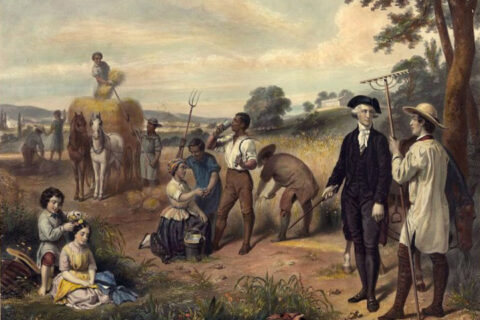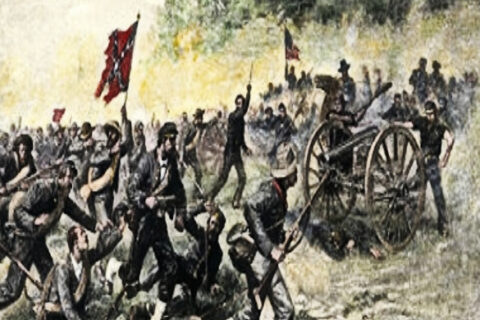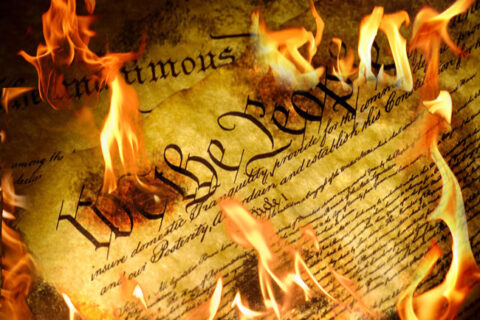“Of one thing we may be certain at the outset. The durability of Origins of the New South is not a result of its ennobling and uplifting message. It is the story of the decay and decline of the aristocracy, the suffering and betrayal of the poor whites, and the rise and transformation of a middle class. It is not a happy story. The Redeemers are revealed to be as venal as the carpetbaggers. The declining aristocracy are ineffectual and money hungry, and in the last analysis they subordinated the values of their political and social heritage in order to maintain control over the black population. The poor whites suffered from strange malignancies of racism and conspiracy-mindedness, and the rising middle class was timid and self-interested even in its reform movement. The most sympathetic characters in the whole sordid affair are simply those who are too powerless to be blamed for their actions.”-Sheldon Hackney while reviewing C. Vann Woodward’s The Origins of the New South: 1877-1913
An oft discussed position which unifies Southern Identitarians manifests as staunch, unwavering opposition to Whiggery and a general support for Jeffersonian Republicanism, or some memetic descendant of sorts. However, the overlooked fact prevails once proper reading has been undertaken by seekers of historical accuracy wishing to justify Dixie’s struggles against the Empire which holds that Southerners were far more Whiggish and moderate than generally depicted. Even within a contemporary context, Southerners carry a moderate stance on socio-political issues more so than often acknowledged. Despite the universally touted position which holds Southerners unilaterally supported John C. Breckinridge’s bid for president, subsequent secession from the Union, and malicious support for unhindered Jim Crow legislation, this approach holds little weight in the context of accurate studies of Dixie’s history. This essay seeks to explain the Whiggish nature of the South before the War Between the States and the following Unionism, how it developed into the Bourbon Democrats, and the moderate stances many Southerners took, and still take, during the following eras.
During the 19th century, the Whig Party found vast Southern support, specifically in wealthier areas. Exorbitantly wealthy plantation owners benefited greatly from supporting Whiggish views and generally took stances as moderates. A noteworthy amount of Southerners voted in favor of the Whig Party during the presidential elections from 1836 to 1848. However, the growing sectional conflicts between Northern and Southern states collapsed the Whig Party. While many within the Whig stronghold regions of the Mississippi Delta, central Alabama, central Georgia, and various locales within Appalachia moved to the Constitution Union Party, most ultimately transitioned over to the more States’ Rights oriented Democratic Party, most notably in the Deep South.

Exactly who constituted the Whig supporters below the Mason-Dixon Line during the Antebellum Period remains a bit eclectic. While the primary constituents consisted of Planters of a wide variety of extracts, a large number of Scots-Irish Appalachians also endorsed Unionism generally out of an opposition to the, in their view, loathsome Planter Class. Sugar Planters and hemp Planters leaned Whig more than most of the constituents in their respective class, but rice Planters and sea island cotton Planters also held Whig tendencies. Sugar planters tended towards Whigs sympathies due to competition with sugar production on a global level and therefore tended to support tariffs which hindered importation of sugar from Latin American; additionally, hemp farmers also competed within the local market. Sea island cotton planters, though supportive of either Democrats or Whigs, tended toward Whig sentiments due to the lack of financial effect any monetary policy would have on the export of their producing, this being an effect of the high demand for sea island cotton on the world market. Other reasons for opposing secession usually included Jacksonian conservative sentiments, contrary to the intention of the Founders, support for the federal government out of desire for economic and political security which some believed it provided, aforementioned Appalachian hatred for the wealthy cotton Planters, and a threat to the financial prosperity of the Planter class.
The staunchest supporters of the Democratic Party and secession resided primarily among poor whites within the Deep South and the upland cotton Planters, also primarily within the Deep South. Their reliance on the British market for exportation of upland cotton and importation of manufactured goods put them at odds with federal tariffs. The actions of the Jackson Administration, various attempts to hinder the financial and political aspirations of the region throughout the 19th Century, and a multitude of economic blunders at the behest of the Whig Party as well as Northern whims also embittered the sectional relations to the point of outright malice.
Southerners, primarily in the former Whig strongholds, withheld support for secession far more than often noted though not quite as much as Northern propaganda often claimed. Within the Deep South, both Alabama and Georgia experienced divided populations on the discussion of seceding but ultimately decided to leave the Union. East Tennessee, Northwest Virginia, Northern Arkansas, Texas Hill Country, and a number of isolated counties all opposed secession to one extent or another due to previously mentioned factors.

Omitting discussion of the tumultuous, abhorrent Reconstruction Era, the Jim Crow Era, when studied objectively, often fails to uphold its reputation as a period of relentless white Southern bestial violence steeped in racial animosity. The Bourbon Democrats came into existence during the previously mentioned Reconstruction Period, ultimately comprising the majority of the Redeemers. Being the Southern faction of the Bourbon Democrats, the Redeemers often came from Antebellum Aristocratic families and generally governed in the moderate stances associated with their position within society, resulting in a ruling class in which the former Whigs easily infiltrated the Democratic Party and worked actively against its naturally Jeffersonian and populist sympathies.
The moderate, self-interested stances of the Bourbons garnered a negative reaction from lower class whites as the 19th Century continued. The remnants of the Antebellum Aristocracy knew of the belligerent attitudes of poor whites toward themselves and the newly freed Negroes. Seeking political capital and safety for themselves as well as the possibility of re-employment of Negroes, Bourbons passed the beginnings of a number of laws, following the Compromise of 1877, designed to enforce a makeshift social hierarchy, with race as a main factor. These fledgling laws continued to develop as the century continued and ultimately culminated in the passage of new state constitutions. Beginning in 1890, states would pass more descriptive constitutions which addressed racial issues in much greater detail, giving birth to the Jim Crow Era proper.
However, this new age did not exacerbate the violence of the Reconstruction Period; it quelled the unrest. As the Jim Crow Era continued, Southerners, while marginally much poorer and destitute than their various American contemporaries due to discriminatory economic policies, enjoyed a wide array of freedoms not granted to the vast majority of other regions within the Empire. Southern governors held the privilege of governance without encumbrance at the behest of the federal government so long as Southerners no longer ruffianly resisted the pursuits of said government. During this time, the previously mentioned ability to maintain a rigid social structure and unhindered self-governance kept poor Caucasians within the region tame.
While the Deep South throughout this period maintained a moderate amount of Jeffersonians, conservatives, and reactionaries within the Democrats, most of Dixie’s Democratic Party constituted primarily of Whig descendants, whether literally or philosophically. The Hamiltonian takeover reared its head during the late 19th century and the early 20th century with the endorsement of the New South Movement. The embrace of focus on economic gains and industrialization, particularly in the Upper South and Texas, displayed clear evidence of the Whig’s quiet takeover in the areas. Additionally when considering who occupied the Confederate Government’s multitude of positions, it becomes clear just how much power the Whigs already held. During these decades, the former Whigs worked diligently to suppress and oust the Jeffersonian sentiments of the Democrats. Their ideological descendants would later work against conservative and reactionary Southern Democrats during the 20th Century.
Considering this fact, it comes of no surprise the positions which the Southern Democrats held during the post-World War II era as well as their motivations for instituting Jim Crow Laws in the first place. Being driven by their desire for financial and political gain via working through the American System as opposed to against it, the Whiggish nature of the Southern Elite forced them to concede to government wishes in regards to integration and forfeiture of freedoms with most resistance emanating from the Deep South.
On a societal level, the general Southern populace, though angered, generally conceded to defeat and immediately began rewriting history in favor of the federal government’s perspective on the matter of Jim Crow. This carried the effect of many outright refusing to pass down stories of the chaos of that second Reconstruction Period as the forefathers did following the first with very little written in defense of the Jim Crow Era unlike the multitude of defenses written of the practice of slavery during the Antebellum Period. Open opposition to resistance organizations such as the Citizens’ Councils grew enormously, and many simply went about their lives within an integrated society, bending the knee to the government and passing up the opportunity for the South to “rise again” when given the justifiable opportunity to do so. The Southern ruling class ultimately ensured the compliance of their constituents and gave them over to the tyranny of the North. This effect carries into contemporary times with Southern politicians often caving to Northern demands and allowing the ever increasing hatred of government propaganda into the school systems of their respective states all for the sake of political capital which ironically those traitors never received.
The rule of Hamiltonian Whiggism continues to this day. Since the second half of the 19th century, they have utilized toxic schemes to ensure their center-right stances continue to infect the minds of lower class Southerners, utilizing this influence to sway the minds of lesser but well meaning individuals. Additionally, moderate Southerners, notably within the middle-class, seem all too eager to throw their brothers under the bus for the sake of social acceptance and maliciously police the actions of extant Southern Identitarians and Confederate sympathizers. Examining the history of Whig influence on Southern politics and the gravitation towards moderate stances of the regional populace only solidify this truth. The Hamiltonian view holds sway over Southerners with no means structurally for them to embrace the Jeffersonian tradition or any Southern tradition for that matter. The media, economic policies, and American System rendered Southern Nationalism extinct following the 1960’s with the only remaining elements relegated to the fringe with no voice and a malicious, yet recreant, hatred from their own sectional kindred who remain all too interested in pleasing the tyranny of rival, hostile region within the Empire. Unlike the stereotypes often leveled at the region, compliance with the American norm appears as a constant below the Mason-Dixon Line.
“The White people of the South are the greatest minority in this nation. They deserve consideration and understanding instead of the persecution of twisted propaganda.” –Strom Thurmond






When I first started reading this article it seemed very anti-south to me, but as I continued reading I saw more an more truths. It’s a shame that we’ve allowed Whig control for so long, but it’s just the reality. Hamilton is no hero of the south like schools an movies try to make him , but instead he’s nothing more than a Yankee who hated everyone’s guts under Mason-Dixon Line an was seeking as much control as possible with his central bank ideas.
This is a very gloomy outlook on where we are as far as allowing our history to be rewritten an cowering our head down in defeat by as you said just compling with the American norm. Are we really doomed to be completely wiped out with this generation by the Whig elites? Will any southerner always be displayed only in mockery an shame until we’re mostly forgotten because of intentional demographical shifts from yankee transplants to illegal immigrants who continue poison this great land to the elites satisfaction? Will we ever have a chance to rise again or even gain respect in the country that hates us? If this is really the case we’re in an have nothing we can about it than why do we continue to fight for Dixie?
Surely there’s still some hope right? Surely we’ll be able to take it all back from the Carpetbaggers right? Right? This article as truthful as it is makes me feel nothing but anger an defeat, an I feel like any other true southerner left out there would feel the same.
When I first started reading this article it seemed very anti-south to me, but as I continued reading I saw more an more truths. It’s a shame that we’ve allowed Whig control for so long, but it’s just the reality. Hamilton is no hero of the south like schools an movies try to make him , but instead he’s nothing more than a Yankee who hated everyone’s guts under Mason-Dixon Line an was seeking as much control as possible with his central bank ideas.
This is a very gloomy outlook on where we are as far as allowing our history to be rewritten an cowering our head down in defeat by as you said just compling with the American norm. Are we really doomed to be completely wiped out with this generation by the Whig elites? Will any southerner always be displayed only in mockery an shame until we’re mostly forgotten because of intentional demographical shifts from yankee transplants to illegal immigrants who continue poison this great land to the elites satisfaction?
I had no idea so many counties in CA and Oregon voted for Breckenridge. Also interesting to note how well Breck did in East, KY – of course this is before coal, but East KY was never a major slaveholding region.
Also, Bell, despite hedging his whole presidential run on preserving the union at all costs and attempting to remain loyal to the Union after Lincoln’s election, would eventually side with the CSA after the Union invaded Tennessee.